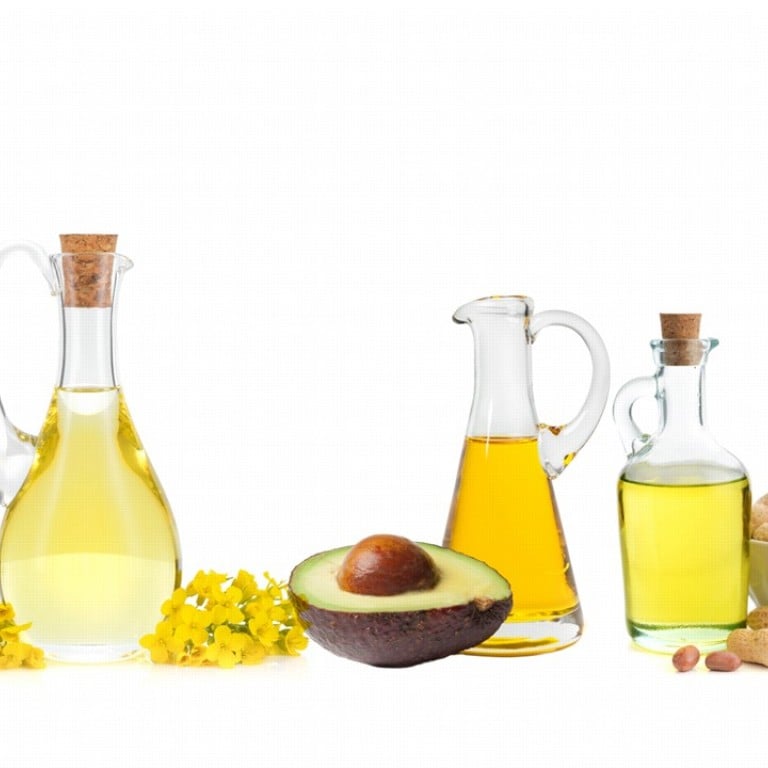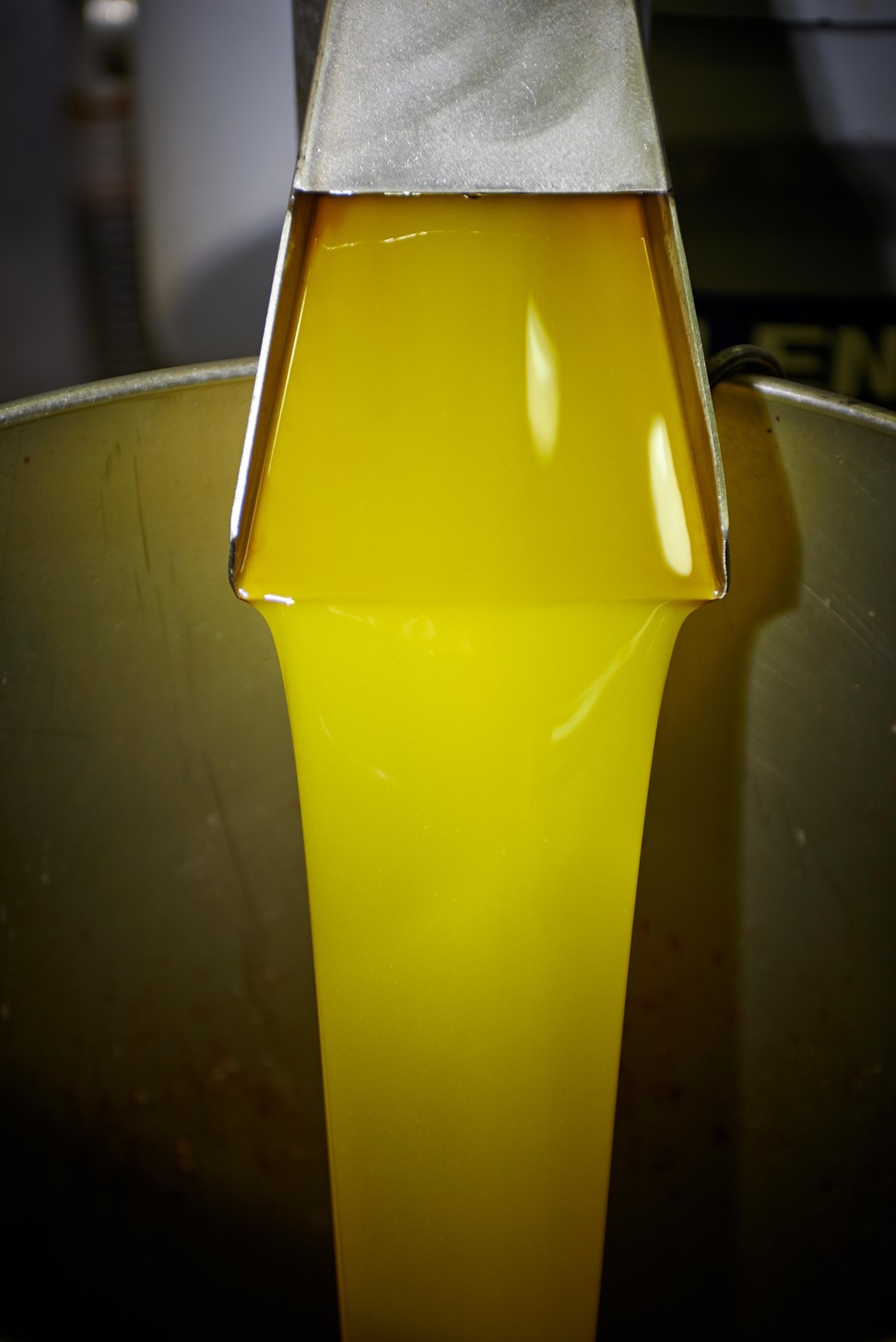
Five of the healthiest cooking oils, and how they give your body a boost
The health benefits of cooking oils can be a complicated subject: some are better at lowering cholesterol while others might become ‘bad fats’ when exposed to high heat. We list our top five, based on input from food experts
With so many varieties of cooking oil available, choosing the healthiest option is difficult. New studies make contradictory claims that can leave a consumer confused about the best choice, while health websites make assertions that sometimes have little real evidence to back them up.
The good news is that all vegetable oil is cholesterol free – only animal products have cholesterol – and some contain the “good fats” MUFA and PUFA (mono- and polyunsaturated fats). Oils with high amounts of MUFA include olive and peanut, while those with high amounts of PUFA include sunflower, canola and walnut.
The nine best veggie burgers in Hong Kong, chosen by a meat-eater and a vegetarian
However, all oils have the potential to become a “bad fat”. When a fat or oil reaches its smoke point – the temperature at which it or smokes – it can turn into a trans fat. Oils such as canola or peanut, which have high smoke points, are therefore recommended for cooking at high temperature. Lower temperature searing or grilling can be done with avocado, sunflower or rice bran oil. In salads, the best oils to use are sesame, walnut, hemp and soybean.

Denise Fair, a dietitian at Central Health Medical Practice in Hong Kong’s Central district, says she gets asked a lot of questions about oils.
“Since they are classified differently, understanding what is healthy can be complicated. It gets further complicated when you look how the oils are processed. A good quality canola oil is recommended for high temperature cooking, but a poorly processed canola oil may not be considered healthy,” she says.
“Similarly with olive oil. Extra virgin olive oil is less processed, has slightly more nutrients and is much better tasting than regular olive oil. Then come GMOs [genetically modified organisms], which is enough to make anyone’s head spin.”

Olive oil is the universal favourite when it comes to healthy oils. Researchers at the Lewis Katz School of Medicine at Temple University in Pennsylvania have identified a specific ingredient in extra virgin olive oil that protects against cognitive decline.
Their study suggests that consuming extra virgin olive oil protects memory and learning ability and reduces the formation of amyloid-beta plaques and neurofibrillary tangles in the brain, which are primary markers of Alzheimer’s disease.
The 10 best nuts to eat, why they’re so good for you, and alternative super foods if you’re allergic
For Hong Kong nutritionist Michelle Lau, an educator at consultancy Nutrilicious, coconut oil has become a particular talking point.
“The hype surrounding coconut oil in the media and among my clients has been hard to ignore. It is hailed as promoting weight loss, and having antimicrobial and antiviral properties,” she says.
“Coconut oil is high in lauric acid, a medium-chain fatty acid that tends to mimic healthy unsaturated fats by raising good cholesterol [when consumed]. However, research shows that while good cholesterol levels appear to rise, so do levels of total cholesterol and bad cholesterol in the blood.
“I would recommend using coconut oil in moderation and blending it with some healthy monounsaturated oils such as olive, canola or avocado oil.”

Most nuts, including walnuts, are an excellent plant-based source of heart-healthy omega-3 fatty acids. Using nut oils and most plant-based oils in place of other saturated fats (such as butter) can also help improve cholesterol levels and may help reduce overall risk of heart disease.
Keep in mind the calories in any type of oil are the same (typically about 120 calories per tablespoon) and can add up, so everything should be taken in moderation.
Highly refined oils are a free radical party which no one should attend
Walnut oil is high in antioxidants and omega-3s and adds a wonderful nutty taste to salads. Fair is a big fan of walnut oil, as it is rich in omega-3 alpha-linolenic acid, which can be converted to DHA (a structural component of the human brain, cerebral cortex, skin and retinas) in the body. The acid is known to help reduce the risk of cardiovascular disease, is high in antioxidants and can lower total cholesterol.
Avocado oil is also high in MUFAs, particularly oleic acid, a heart-healthy fat. It has a slightly higher than average smoke point and can be used for grilling and searing.

According to Cristina Tahoces, a Hong Kong-based nutritionist and owner of Thrive Nutrition Practice, the reason oils such as coconut and avocado are better than others for high temperature cooking is because they are more stable.
The greater the stability of the oil at high temperatures, the fewer free radicals are created. That’s important in a city like Hong Kong, where our free radical load is high due to pollution, pesticides and stress. A high free-radical load creates inflammation in the body, and it is inflammation that is at the root of heart disease – not cholesterol.
Tahoces explains that unhealthy fats and oils are those made in a lab (such as spreadable butter) or those which are highly refined, such as canola, sunflower, soya bean and peanut oils. “I also don’t recommend palm oil, not just because it tends to be highly refined, but also because of its environmental impact. Highly refined oils are a free radical party which no one should attend.”

Stacey Nelson, manager of clinical nutrition at Massachusetts General Hospital in Boston, cautions against reusing cooking oil.
“It is easier for used oil to become rancid, and the oil may possibly contain free radicals – which have been shown to increase oxidative stress and inflammation in the body and may be linked to increased risk of certain cancers. It is safest and healthiest to use new oil each time you cook.”
However, the health impact of cooking oils depends mostly on our overall diet and lifestyle. If you’re swapping your canola oil for avocado oil, but leading a sedentary lifestyle and eating a diet rich in sugar, packaged food and low in fresh foods, chances are you haven’t done anything to decrease your risk of heart disease and other illnesses.

TOP FIVE HEALTHY OILS
Olive
A cardio-protective oil thanks to its polyphenol compounds and fat profile
The high oleic acid content of extra virgin olive oil makes it particularly heart-healthy
Very rich in monounsaturated fatty acids
Smoke point not as high as other vegetable oils so better suited for quick browning, lightly sautéed dishes
Canola
Low in saturated fat and rich in heart-healthy mono- and polyunsaturated fats for healthy arteries and cholesterol levels
Good source of omega-3 and vitamin E
Its neutral flavour is an ideal base for flavoured oils
Has a high smoke point so works well when used at higher temperatures for stir-fries or sautéed dishes
Almost half of Hongkongers have unhealthy BMI and cholesterol, study suggests (even those who look slim)
Avocado
Heart-healthy with a high content of monounsaturated fatty acids
Its levels of oleic acid, vitamin E and carotenoids combat inflammation
The phytosterols in avocado oil lower total cholesterol and LDL (bad cholesterol) levels
Ideal for high-temperature cooking, grilling and oven roasting because of its high smoke point
Peanut
Rich in mono-unsaturated fat and vitamin E as well as phytosterols, which can help manage serum cholesterol levels
Has a high smoke point so works better if frying foods at higher temperatures, making it ideal for Asian foods cooked in the wok
Walnut
Rich source of alpha-linoleic acid and vitamin E
Contains polyunsaturated fats and vitamin K
Can lower total cholesterol, LDL cholesterol and the ratio of LDL to HDL (good cholesterol)
One of the best sources of antioxidants among the tree nuts
